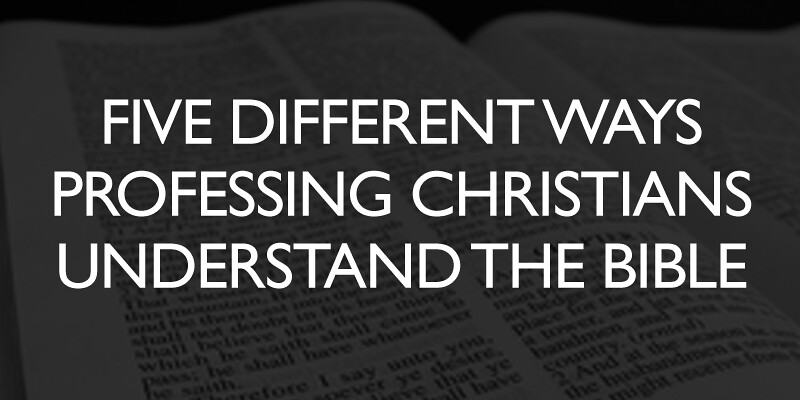 Renowned Old Testament scholar, Dr. Bruce Waltke, in his critically-acclaimed An Old Testament Theology, suggests five different prepositions describing how professing Christian groups understand the Bible. It won’t be surprising, as an evangelical Christian1, that the last view is presented as the one preferred. Still, while admitting the breakdown may represent a “cartoonish presentation” due to its hard distinctions, Waltke hopes these generalizations will help us “recognize and remember the various, and sometimes confusing, approaches ‘Christians’ take to the Bible.”2 Maybe you surprise yourself in seeing where your view of the Bible fits?
Renowned Old Testament scholar, Dr. Bruce Waltke, in his critically-acclaimed An Old Testament Theology, suggests five different prepositions describing how professing Christian groups understand the Bible. It won’t be surprising, as an evangelical Christian1, that the last view is presented as the one preferred. Still, while admitting the breakdown may represent a “cartoonish presentation” due to its hard distinctions, Waltke hopes these generalizations will help us “recognize and remember the various, and sometimes confusing, approaches ‘Christians’ take to the Bible.”2 Maybe you surprise yourself in seeing where your view of the Bible fits?
Liberals Stand ABOVE the Bible
Makes reason, including experience, the ground floor of theological reflection. Reason is placed above revelation and, as they embrace historical criticism, liberals set another “bible” above the Bible. Liberals read the Bible under the canon3 of skepticism, coherence (only “natural” explanations of biblical events), and analogy (this assumes nothing happened in the past that doesn’t happen in the present). With these assumptions, liberals read the Bible to discover what they believe “actually” happened once they strip away what is believed to be tradition or mythology.
Neoorthodox4 Stand BEFORE the Bible
Believes the Bible becomes the Word of God as the listener encounters them in the written “witness” to Jesus Christ. Therefore, the Bible isn’t the locus of revelation as much as how it meets the human audience. Waltke writes that, according to neoorthodox thinkers, “one hears the Word of God in the Bible as one hears music on a scratched record. In this way they tend to set up the canon of the message of Jesus Christ (i.e.– The music) as more valuable then the whole canon of Scripture (i.e. — the record); a canon within the canon. This dichotomy creates an unstable theology — evangelical and unorthodox regarding the authority of all of Scripture. A canon-within-a-canon theology ultimately places authority in the audience.”5
Traditionalists Place Traditions ALONGSIDE the Bible
Finds authority in the text and the tradition that accompanies it. For example, in Roman and Greek Orthodoxy, it is commonplace to affirm that revelation is understandable only through the authoritative tradition of interpretation. Can place systems of doctrines, confessions, or creeds over the Scriptures themselves. While deeply appreciative of written formulations of the Scriptures, such as the Westminster Confession of Faith, Waltke concludes, “When dogma rules, the church is in danger of ceasing to be self-critical.”6
Fundamentalists Stand ON the Bible
Presumes the biblical writers, though writing in an ancient environment, will not have any different or stray thoughts, ideas, or concepts from their modern understanding of the way things are (especially in matters of science and historiography7). For the fundamentalist, the only qualified standard for which the Bible can be measured is the logic of contradiction. Walke writes, “What I have in mind here is that fundamentalists do not ‘stand under’ the Bible long enough to ‘understand’ it.”8
Evangelicals Stand UNDER the Bible
Accepts the inerrancy of Scripture as to its Source and its infallibility as to its authority. Needs the inspired revelation of the divine reality to judge wisdom or folly, right or wrong. Waltke writes, “I dare not presume to understand what this revelation means before coming to it on its own terms. I must allow the Bible to dictate how it seeks to reveal God’s truth. I study how it writes history; I examine and learn to recognize the different forms of literature: poetry, narrative, prophecy, and so on. I consider the Bible utterly trustworthy and I commit my life to it, but I do not presume to know beforehand the exact nature of its parts. With this posture, I must allow myself to be taught and corrected by the Bible.”9
Footnotes
- Waltke writes, “I label my own position as ‘evangelical’ for lack of a better term.” (77)
- Waltke, 73.
- The word canon refers to a body of work considered sacred or scriptural.
- Neoorthodox is a reactionary movement to liberal theology. Theologian Karl Barth represents someone from the neoorthodox tradition.
- Ibid, 75-76.
- Ibid, 76.
- Historiography is the study of the writing of history
- Ibid, 77.
- Ibid.
